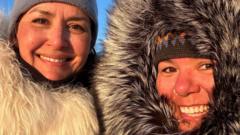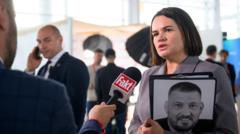Kathy Kettler, campaign manager for candidate Kilikvak Kabloona, shares insights on the complexities of running a campaign in Canada's remote northern territory.
Elections in Canada's Arctic: A Journey Through Challenges and Community Spirit

Elections in Canada's Arctic: A Journey Through Challenges and Community Spirit
Understanding the unique obstacles faced in Nunavut's electoral process amidst a backdrop of cultural richness.
In Nunavut, the largest federal district in Canada, the unique beauty and challenges of conducting elections reflect a cultural richness that few outside the region truly understand. With a land area of 1.8 million square kilometers, roughly three times the size of France, and just 40,000 residents, Nunavut is home to a population that is tightly-knit yet faces significant obstacles.
Kathy Kettler, the campaign manager for local Liberal candidate Kilikvak Kabloona, describes the logistical hurdles of campaigning in an area largely accessible only by air. "Yesterday, in 24 hours, we traveled 1,700 kilometers by air and campaigned in Pangnirtung, Iqaluit, Rankin Inlet, and Arviat," Kettler remarked. The capital city of Iqaluit presents its own set of challenges with temperatures often below freezing for eight months each year.
The cultural dynamics in Nunavut are distinctly different from southern Canada. Kettler reflects on her experiences, noting that in the smaller communities, visitors generally "walk in and say hello," a stark contrast to the door-knocking tradition prevalent in southern areas. As she campaigns in extreme cold, she acknowledges the struggles of connecting with voters, especially in a region where necessities like food and clean water can be scarce.
With a majority-Inuit population, many residents communicate in Inuktitut, posing additional challenges for campaign signage and engagement. The local community's priorities differ significantly from the national conversations, focusing on immediate issues such as food security instead of broader topics like Arctic sovereignty.
Election logistics are complex; Jean-Claude Nguyen, the returning officer for Nunavut, describes the process of ensuring ballots reach remote communities, including gold mines. The humorous anecdotes, like a raven trying to feast on a ballot box during the 2019 election, underscore the region's unique circumstances.
Despite facing these logistical and cultural challenges, Kettler remains inspired by the community's spirit. "The generosity, love, and care that people have for each other in every community shines through," she said, emphasizing the meaningfulness of campaigning in Nunavut. As elections approach in this diverse and remote territory, the spirit of the people adds vibrancy to a process marked by unique beauty and resilience.
Kathy Kettler, the campaign manager for local Liberal candidate Kilikvak Kabloona, describes the logistical hurdles of campaigning in an area largely accessible only by air. "Yesterday, in 24 hours, we traveled 1,700 kilometers by air and campaigned in Pangnirtung, Iqaluit, Rankin Inlet, and Arviat," Kettler remarked. The capital city of Iqaluit presents its own set of challenges with temperatures often below freezing for eight months each year.
The cultural dynamics in Nunavut are distinctly different from southern Canada. Kettler reflects on her experiences, noting that in the smaller communities, visitors generally "walk in and say hello," a stark contrast to the door-knocking tradition prevalent in southern areas. As she campaigns in extreme cold, she acknowledges the struggles of connecting with voters, especially in a region where necessities like food and clean water can be scarce.
With a majority-Inuit population, many residents communicate in Inuktitut, posing additional challenges for campaign signage and engagement. The local community's priorities differ significantly from the national conversations, focusing on immediate issues such as food security instead of broader topics like Arctic sovereignty.
Election logistics are complex; Jean-Claude Nguyen, the returning officer for Nunavut, describes the process of ensuring ballots reach remote communities, including gold mines. The humorous anecdotes, like a raven trying to feast on a ballot box during the 2019 election, underscore the region's unique circumstances.
Despite facing these logistical and cultural challenges, Kettler remains inspired by the community's spirit. "The generosity, love, and care that people have for each other in every community shines through," she said, emphasizing the meaningfulness of campaigning in Nunavut. As elections approach in this diverse and remote territory, the spirit of the people adds vibrancy to a process marked by unique beauty and resilience.





















